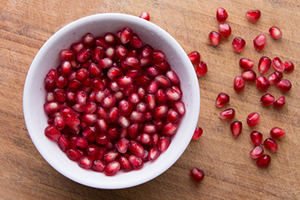 Occasionally scientists stumble onto information that is promising not only for people who suffer from diseases, but also for those who just enjoy good food.
Occasionally scientists stumble onto information that is promising not only for people who suffer from diseases, but also for those who just enjoy good food.
A recent study concluded that some genuinely tasty foods may be able to control Alzheimer’s disease even better than drugs.
If you enjoy researching natural health topics and following a naturally healthy lifestyle, you have probably heard of polyphenols, the chemicals found in red wine, red grapes, berries, and several other food types. They are powerful antioxidants, which explains why naturopaths recommend them so liberally.
An increasing number of researchers have become interested in the ability of one of these polyphenols to prevent and slow the progression of Alzheimer’s disease. It is called resveratrol, and is a prominent ingredient in red wine, red grapes, pomegranate, dark chocolate, peanuts, and soybeans.
In September 2015, Neurology distributed an article in which a team of American researchers demonstrated that resveratrol might be an effective Alzheimer’s disease treatment.
Researchers divided 119 Alzheimer’s patients into groups that either received resveratrol or a placebo. The resveratrol group started with 500 mg per day, escalated by 500 mg every 13 weeks, for an eventual total of 2 g per day.
By the end of the year, the resveratrol group had approximately the same levels of amyloid-beta40 (Abeta40) in their blood and cerebrospinal fluid as at the beginning of the experiment. The placebo group, on the other hand, had substantially lower levels, an effect that usually accompanies the progression of Alzheimer’s disease. An MRI scan also revealed that the swelling of the brains of the resveratrol subjects had diminished considerably.
While some participants complained of nausea, diarrhea, and weight loss, resveratrol was relatively free of side effects.
The authors warned that they had used a special pharmaceutical-grade resveratrol and claimed that you would have to drink about 1,000 bottles of wine to obtain the same amount. For that reason, together with their relatively small number of participants, they advised that their findings should be further tested, rather than immediately acted upon.
The way in which resveratrol manages dementia is still being researched.
A team at Oregon’s Health and Science University reviewed the literature in the journal Brain Research Reviews, and concluded that resveratrol activated sirtuin proteins, which also happen to be activated by low calorie diets.
These proteins have been shown to protect the brain cells of mice with Huntington’s disease, a disease that causes dementia and the degeneration of brain cells.
Another study by researchers at the Litwin-Zucker Research Center for the Study of Alzheimer’s Disease has established that resveratrol does not inhibit the production of Abeta, but rather promotes its intercellular degradation. In other words, resveratrol kills the Abeta between cells, instead of allowing it to form plaque inside them.
Pure resveratrol supplements are available from natural health stores, and you can further stack your diet with the foods that contain it. Who knows, altogether you might manage to obtain enough of it to protect your brain cells from age-related decline.

 Multiple Sclerosis
Multiple Sclerosis Banishing Bronchitis
Banishing Bronchitis Gum Disease Gone
Gum Disease Gone Overcoming Onychomycosis
Overcoming Onychomycosis Neuropathy No More
Neuropathy No More The Prostate Protocol
The Prostate Protocol Brain Booster
Brain Booster
 Ironbound
Ironbound
 Solution for Shingles
Solution for Shingles
 The Bone Density Solution
The Bone Density Solution
 The Ultimate Healing Protocol
The Ultimate Healing Protocol
 The Parkinson's Protocol
The Parkinson's Protocol
 The Chronic Kidney Disease Solution
The Chronic Kidney Disease Solution
 Overthrowing Anxiety
Overthrowing Anxiety The Fatty Liver Solution
The Fatty Liver Solution The Hypothyroidism Solution
The Hypothyroidism Solution
 The End of Gout
The End of Gout The Blood Pressure Program
The Blood Pressure Program
 The Oxigized Cholesterol Strategy
The Oxigized Cholesterol Strategy
 Stop Snoring And Sleep Apnea Program
Stop Snoring And Sleep Apnea Program
 The Arthritis Strategy
The Arthritis Strategy The Vertigo & Dizziness Program
The Vertigo & Dizziness Program The 3-Step Diabetes Strategy
The 3-Step Diabetes Strategy Hemorrhoids Healing Protocol
Hemorrhoids Healing Protocol The Erectile Dysfunction Master
The Erectile Dysfunction Master Weight Loss Breeze
Weight Loss Breeze The IBS Program
The IBS Program The Insomnia Program
The Insomnia Program The Migraine and Headache Program
The Migraine and Headache Program The Neck Pain Solution
The Neck Pain Solution The Menopause Solution
The Menopause Solution The Ejaculation Master
The Ejaculation Master The TMJ Solution
The TMJ Solution The Acid Reflux Solution
The Acid Reflux Solution The Fibromyalgia Solution
The Fibromyalgia Solution The Psoriasis Strategy
The Psoriasis Strategy
Extreme exercise is known to work also.
Turmeric, 1 gram daily has been shown beneficial [Science Daily]